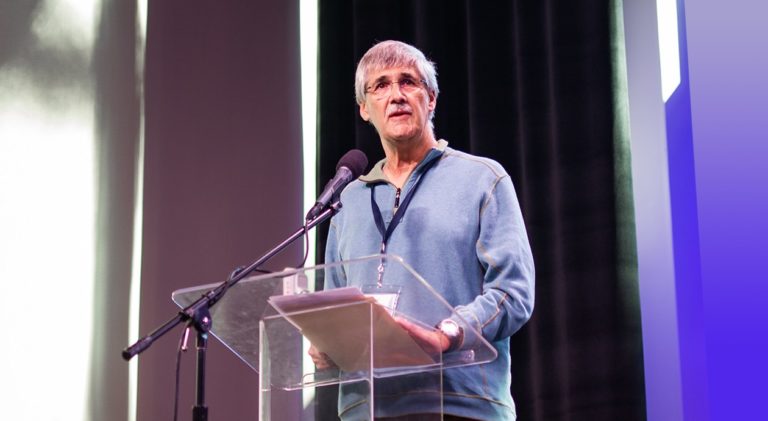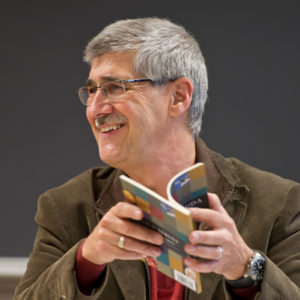John Paul Lederach
Poetry From the On Being Gathering
This year, we were thrilled to host our very first On Being Gathering — a four-day coming-together of the On Being community for reflection, conversation, and companionship — at the 1440 Multiversity in the redwoods of Scotts Valley, California. We greeted each day with verse from some of our most beloved poets — and now we’d like to share these delightful moments with all of you. Peacemaker and poet John Paul Lederach opened Monday with a series of haikus.

Image by Bethany Birnie, © All Rights Reserved.
Guest

John Paul Lederach is a senior fellow at Humanity United and professor emeritus of international peacebuilding at the University of Notre Dame. He is also the co-founder and first director of the Eastern Mennonite University’s Center for Justice and Peacebuilding. In 2019 he won the Niwano Peace Foundation Peace Prize.
Transcript
Krista Tippett, host: Poetry reading framed the On Being Gathering this year. And we are so happy now to share these slices of beauty, elation, and contemplation with you. Here’s how peacemaker and poet, John Paul Lederach, opened our Monday morning.
[applause]
John Paul Lederach: Thank you. I had no idea what Krista had in mind when she said, “Haiku, Monday morning.” So this is titled “Monday Haikus.” The story is told of the master, Bashō, and his disciple, Kikaku, of the morning that Kikaku came back from the fields and said, “I have written a haiku.” And Bashō invited him; they sat, and he read the haiku.
“Take a pair of wings / from a dragonfly, you would / make a pepper pod” — five syllables, seven syllables, five syllables — perfect haiku. Bashō said, “This is not a haiku. You killed the dragonfly. The haiku is: Add a pair of wings / to a pepper pod, you would / make a dragon fly.”
Near the end of his life, Bashō said, “Across all these years, I have only written but four or five haikus.” What an extraordinary thing to say, for a man who probably could write 15 or 20 in a single morning, who practiced it for decades. I’ve often wondered what he might have meant. Perhaps it’s this — that he understood haiku as a practice, that was to notice the ways that you might capture the wonder of the human experience in the simplest of terms. It combines the beginner’s mind — what we might call joy, with ancient wisdom — what we might call patience. How do you hold joy and patience, particularly when things fall apart and harm burrows in?
At a certain time in my peace-building journey, sitting close to and with human suffering, little by little I was experiencing a deadening of my soul. Sometimes we call this “burnout.” The ancestor presence of Bashō arrived unexpectedly. It’s amazing how something you learn in the second grade could become the light that enlivens the spirit. As an adult second-grader, my rediscovery was in understanding haiku as a contemplative practice, the seeking of the haiku attitude; that is, to prepare yourself to be touched by beauty, the noticing of the haiku moment that is the aha when the world is revealed for what it is — and that simple form, that five-seven-five that was landed on and experienced because it could be said in a single breath. So I started writing haiku, and I never stopped — finger-tapping choreography of life. If you ever see me walking, and you see me tapping, it’s because there are haikus all around you.
Over time, I found that haiku was a traveling compass that holds a very strange needle. It’s not interested in north. It spins wildly, as long as you busy your way through life, and it only slows and points when you slow enough to notice. I’m learning to listen in haiku — in conflicts, in conversations, in office hours. I sometimes take meeting notes in haiku.
[laughter]
I once got so tired of writing trip reports that I submitted a haiku as my report.
[laughter]
A very small note of advice — this strategy did not seem to translate into further funding.
[laughter]
But my soul felt whole. And it actually became a practice. Can you capture the whole of a trip in a single haiku? Could you capture the whole of this weekend in a five-seven-five? Sometimes I cheat, and I add a title. They are usually very long.
[laughter]
Seeking joy and patience could also describe my wandering in the backcountry, in that maze of those poorly marked trails in the academic wilderness. I discovered there that we have no empirical evidence that being more serious leads to greater insight into the human condition than being playful. There is, however, growing empirical evidence that being playful opens toward the ever-elusive, supple heart.
I don’t much hashtag.
[laughter]
Sorry, Erinn. I don’t much hashtag. In fact, I’ll confess, I’ve been trying to form an organization that carries the title, “Luddites of the world, unite!” So far, according to Seth, I have nobody signed up.
But I do geotag, which we could call a “haiku tag.” A haiku tag: Being awake enough that you can hear when your haiku compass needle has stopped, and you notice where you are, who you are with, and the meaning of the moment. This will have something to do with your journey. So let me geotag a few haikus.
“Tajikistan” — “Gods and men love maps. / They draw borders with pens that / split lives like an axe.”
“Belfast” — “Maybe, he says, this / is as good as it will get. / Peaceful bigotry.”
“Sister Mary’s Northern Uganda” — “For all the children / we smile amidst the suffering / to give them courage.”
“Lake Dillon, Colorado” — “Maybe this is love: / to see and reflect beauty / without a word.”
“Yangoon” — “Black hair, yellow rose. / She gazed across the lake, / wingless, soaring flight.”
“Burma Border People” — “Don’t ask the mountain / to move. Just take a pebble / each time you visit.”
“Inside the P.W. Akkerman Pen Shop in The Hague, the Netherlands, with a Really Expensive Mont Blanc in Hand” — “Pen tryouts today. / The well’s dry, but sun rises. / Scribble on, my friend.”
Let me say that if you are ever in an important, big airport, with a lot of layover boredom, please go to the Mont Blanc pen store. Saunter in as if the world is at your beck and call. It is. Ask to see the latest, biggest pen they have. Ask for a blank sheet of white paper, 20- or 30-pound preference.
Close your eyes. Take a deep breath. Write a single haiku. If one does not land, just recall a favorite line — “The arc of moral / history is long, but it / bends toward justice.”
Return the pen and say, “I’m thinking about it.”
[laughter]
Smile. Offer gratitude. Leave the poem. We never know, really, where change begins.
Geotag: “1440 Days, Seven Haikus, Numbered”
One: “Stop. Sit. Light. Wine. Bread. / Tender Shabbat shalom-ness. / Braided as we are.”
Two: “Proximate to pain. / Experiential divides / demand our fierce love.”
Three: “Wild and unruly. / Quiet enough to be held. / Silence between words.”
Four: “Today, wide awake, / America. Patience. Eula / spoke and blessed me.”
Five: “When shards fly and flee, / supple hearts, forests, and seas / hold space for babies.”
Six: “Fear will not leave. / Assurances never suffice. / Invite fear to dance.”
With all this in mind, I offer this haiku to Krista and that On Being team.
Number seven, with a title, “Grandma’s Recipe for the Numbed-Soul Blues” — “Just take a snippet / from Krista Tippett and bake / a sweet bee pie.”
[laughter]
Thank you, very much.
[applause]






Reflections